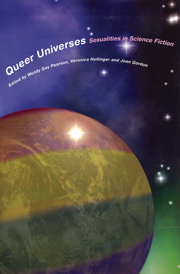War Machine, Time Machine
from Part I - Queering the Scene
Summary
[It] is quite possible for a work of literature to operate as a war machine upon its epoch.
— Monique Wittig, The Straight Mind 69Yes, but is it art?
— AnonymousNicola
The golden age of queer sf is 20. Or maybe it was the 1970s. Or perhaps it was in France. It's all relative, like the notion of ‘queer’ itself.
My golden age began in Scotland, when I was 20. My girlfriend and I were sleeping on a friend's floor, travelling about a bit, absorbing life – and lots of hash. A woman handed me a book, saying, ‘I hear yeez like the wee aliens and shite. Have ye read any with gur-uls before?’ I have a vague memory of glancing at a blue-ish cover before returning to the serious business of reducing my brain to a microdot. But at some ungodly hour of the morning, I opened the book – Sally Miller Gearheart's The Wanderground – and fell into it.
It blew me away. For a 20-year-old escapee from Catholic World, where the consensus was that I was going to hell, it was visionary dynamite. Under the sunlight of story, the essentialist feminist theory I'd read but not embraced flowered into a magical paradise.
The early 1980s were a time when I was being thrown against the wall by members of the Special Patrol Group, and harassed by local plods simply for being a dyke, when many women I knew were at Greenham Common fighting for world peace (and I was just fighting).
- Type
- Chapter
- Information
- Queer UniversesSexualities in Science Fiction, pp. 39 - 50Publisher: Liverpool University PressPrint publication year: 2010



